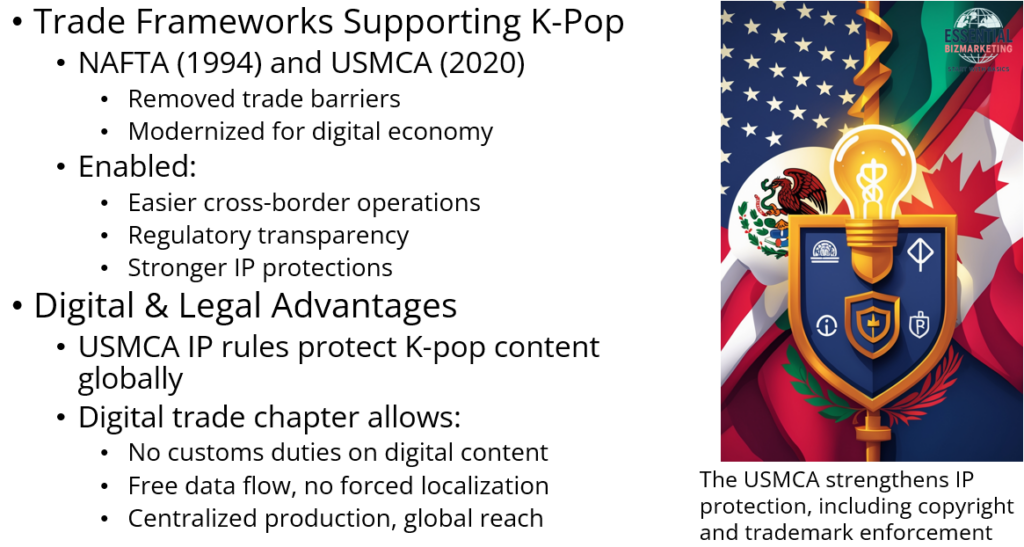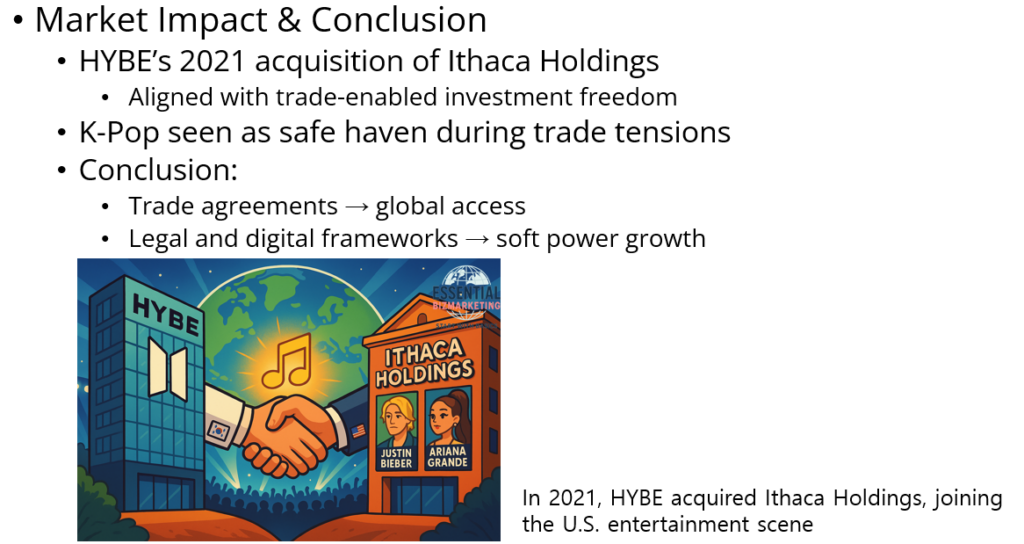Introduction: Trade Policy Meets Pop Culture

The global rise of K-pop is often attributed to digital platforms, fan communities, and powerful branding—but trade agreements have also played a subtle yet crucial role. The North American Free Trade Agreement (NAFTA), and its successor, the United States-Mexico-Canada Agreement (USMCA), while not directly crafted for cultural exchange, have nonetheless created favorable structural conditions for South Korean entertainment companies to penetrate the U.S. market. By enhancing the flow of digital content and protecting intellectual property rights, these trade frameworks have indirectly supported K-pop’s North American expansion.
NAFTA and USMCA: A Foundation for Market Access
NAFTA, enacted in 1994, eliminated trade barriers between the U.S., Canada, and Mexico. In 2020, it was replaced by the USMCA, which modernized the agreement to reflect today’s digital economy. These agreements primarily target goods and services but have spillover effects on cultural industries by easing cross-border operations, ensuring regulatory transparency, and enabling smoother market entry.
Intellectual Property Protections That Empower Creators
The USMCA significantly enhances the protection of intellectual property (IP), including copyright and trademark enforcement. These provisions are crucial for entertainment companies like HYBE and SM Entertainment, whose business models depend on controlling and licensing K-pop content globally. With stronger IP safeguards, these firms can export content with greater legal confidence, reducing risks of unauthorized distribution and piracy.
Digital Trade as a Cultural Highway
USMCA’s digital trade chapter prohibits customs duties on digital products and ensures the free flow of data across borders. Since much of K-pop’s influence in the U.S. is driven by streaming platforms, social media, and digital merchandising, these provisions serve as a digital highway for Korean content. The agreement also prevents forced data localization, allowing companies to centralize content production in Korea while reaching global audiences.
Case Study: HYBE Corporation’s Strategic Leap

The business strategies of HYBE (formerly Big Hit Entertainment) exemplify how these trade conditions can be leveraged. In 2021, HYBE acquired Ithaca Holdings—home to U.S. stars like Justin Bieber and Ariana Grande—signaling a deliberate move to integrate into the American entertainment value chain. This merger not only gave HYBE instant market access but also aligned with trade conditions that ease capital movement and corporate collaboration across borders.
Investment Trends and K-pop’s Safe Haven Status
During periods of geopolitical and trade instability, such as the U.S.-China trade war, K-pop emerged as an alternative investment sector. Its consistent global demand and scalable content made it attractive to investors fleeing volatility. Entertainment companies, flush with capital, used this opportunity to fund international expansion—particularly in the U.S., where legal and trade frameworks were stable and supportive.
Conclusion: Agreements that Amplified Soft Power
Although NAFTA and USMCA were not designed to boost cultural exports, their byproducts—enhanced IP laws, digital trade freedom, and cross-border investment flexibility—have empowered South Korean entertainment firms to thrive in the U.S. Through smart adaptation to trade frameworks, K-pop companies have translated market access into global fandom, turning economic integration into cultural influence.
📚 References
Office of the United States Trade Representative. (n.d.). United States-Mexico-Canada Agreement. https://ustr.gov/trade-agreements/free-trade-agreements/united-states-mexico-canada-agreement
The Guardian. (2025, February 12). Going for a song: Investors flee to K-pop as safe haven amid Trump’s tariff war. https://www.theguardian.com/music/2025/feb/12/donald-trump-tariffs-k-pop-group-investments-soar-stock-market-safe-haven
Wilson Center. (n.d.). Digital trade under the USMCA: A modern opportunity for North American economic growth. https://www.wilsoncenter.org/article/digital-trade-under-usmca-modern-opportunity-north-american-economic-growth
Wikipedia contributors. (n.d.). HYBE Corporation. Wikipedia. https://en.wikipedia.org/wiki/Hybe_Corporation
Council on Foreign Relations. (n.d.). NAFTA and the USMCA: Weighing the impact of North American trade. https://www.cfr.org/backgrounder/naftas-economic-impact
📁 Start exploring the Blog
📘 Or learn more About this site
🧵 Or follow along on X (Twitter)
🔎 Looking for sharp perspectives on global trade and markets?
I recommend @GONOGO_Korea as a resource I trust and regularly learn from.
